- Home Page
- Better Kites
- ... Delta Kite
How to Make a Delta Kite
Step by Step—Page 2 of 4
The MBK Dowel Delta
How to Make a Delta Kite
Spars
For this delta, you need long lengths of 5 mm (3/16 in.) wooden dowel—enough for the two leading edge spars of 1.0 DL (120 cm, 48 in.) and the vertical spar of 0.8 DL (96 cm, 38 1/2 in.). Plus there's the spreader, which is less than 0.9 DL (108 cm, 43 in.). They are easily cut to the lengths required with a small cheap hacksaw. But don't do any cutting just yet:

- Lay down a dowel over the centerline of the sail plastic, mark it at the exact height of the sail, and cut off at the mark. Round off the tips with a wood file. This is the vertical spar.
- Lay down some more dowel along one leading edge of the sail, and cut to length as in the photo up there.
- Round the tips off with a wood file.
- Mark the dowel where the two tabs meet. This is where the spreader crosses (later).
- Do the same for the other leading edge of the kite, with another dowel. If the measurements don't match precisely compared with the first dowel at this point, all is not lost. The kite can still be trimmed to fly straight—more on that later.
TIP: Do your best to ensure the two leading edge spars are about the same stiffness. You can weigh them or just flex them in your hands to compare.
Now for the spreader, which holds the leading edges apart during flight:
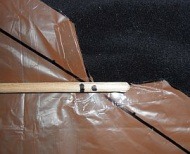
- Lay some dowel across the sail, and cut to length so that the tips end up between the two leading edge tabs. Allow the tips to overhang a little, using the photo there as a guide.
- Making sure the sail is fully stretched out, make marks on the spreader, 0.005 DL (0.6 cm, 1/4 in.) inboard of where it crosses the leading edge spars. See the photo again.
- Make a mark on the spreader where it crosses the centerline of the sail.
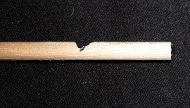
- File a groove into the dowel, where you marked it at each end. Make it half the width of the dowel deep and about the same amount in width. See the photo.
- Round off the tips of the spreader with a wood file.

- From another dowel, cut off a 0.35 DL (42 cm, 16 3/4 in.) length, and make a mark at its center. Line up the center marks, and bind the dowels together with three turns of sticky tape at five spots along the spreader as in the photo. (The tape is hard to see, so I have added orange rectangles at the five spots.)
How to Make a Delta Kite
Attachment Ties
Each leading edge spar will have a shoelace tie, which attaches it to one end of the spreader:
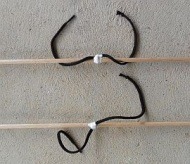
- Measure and cut off two 0.25 DL (30 cm, 12 in.) lengths of shoelace. To prevent the cut ends from fraying, just tie a Simple knot near the end.
- Attach the ties at the spar crossing-points that you marked on the leading edge spars. A tight Granny knot will do, leaving equal lengths of shoelace on either side of the knot.
- Put some glue around the knot and onto the wood as in the photo. Otherwise, the tie will slip rearwards when the kite flies.
For the following, you will need to use pieces of electrical insulation tape. Unless otherwise noted, make each one about four times longer than it is wide:
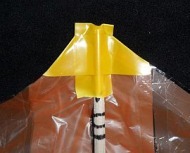
- Spread out the sail, with the edge tape facing upwards.
- Lay down the vertical spar over the sail, with the heavy end at the bottom. Cap the top tip of the spar with tape by sticking tape down over the dowel and plastic then folding it around and under the plastic to stick on the other side—a bit tricky, so take your time!
- For added strength, put another piece of tape around the leading edge. See the completed cap in the photo.
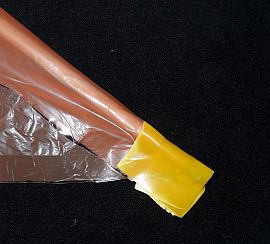
- Now do the bottom tip of the spar similarly, but just use one piece of tape.
- Put the leading edge spars in place, and then tape down the sail tabs with clear sticky tape, forming those sleeves. After the first one or two test flights, you might need to remove one leading edge spar to reduce its diameter a little with a wood file! More on this later.
- Fold a piece of tape around the lower tip of each leading edge spar, capping the spar so it can't slide out. Try to ensure there is very little of the dowel actually touching the tape in case you need to remove the spar later. Then fold another piece of tape around the leading edge for added strength. See the photo.
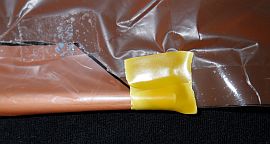
- Place a square piece of tape over the upper tip of each leading edge spar. See the photo. After the kite is flying perfectly, you can make these a little more secure by using more tape if you want to.
As mentioned earlier, there's more kite making on this site than you can poke a stick at. :-)
Want to know the most convenient way of using it all?
The Big MBK E-book Bundle is a collection of downloads—printable PDF files which provide step-by-step instructions for many kites large and small.
That's every kite in every MBK series.
